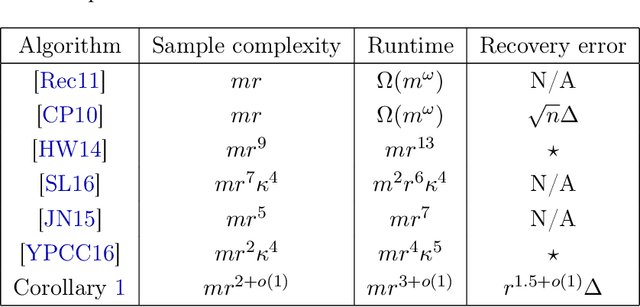Matrix Completion in Almost-Verification Time
Paper and Code
Aug 07, 2023
We give a new framework for solving the fundamental problem of low-rank matrix completion, i.e., approximating a rank-$r$ matrix $\mathbf{M} \in \mathbb{R}^{m \times n}$ (where $m \ge n$) from random observations. First, we provide an algorithm which completes $\mathbf{M}$ on $99\%$ of rows and columns under no further assumptions on $\mathbf{M}$ from $\approx mr$ samples and using $\approx mr^2$ time. Then, assuming the row and column spans of $\mathbf{M}$ satisfy additional regularity properties, we show how to boost this partial completion guarantee to a full matrix completion algorithm by aggregating solutions to regression problems involving the observations. In the well-studied setting where $\mathbf{M}$ has incoherent row and column spans, our algorithms complete $\mathbf{M}$ to high precision from $mr^{2+o(1)}$ observations in $mr^{3 + o(1)}$ time (omitting logarithmic factors in problem parameters), improving upon the prior state-of-the-art [JN15] which used $\approx mr^5$ samples and $\approx mr^7$ time. Under an assumption on the row and column spans of $\mathbf{M}$ we introduce (which is satisfied by random subspaces with high probability), our sample complexity improves to an almost information-theoretically optimal $mr^{1 + o(1)}$, and our runtime improves to $mr^{2 + o(1)}$. Our runtimes have the appealing property of matching the best known runtime to verify that a rank-$r$ decomposition $\mathbf{U}\mathbf{V}^\top$ agrees with the sampled observations. We also provide robust variants of our algorithms that, given random observations from $\mathbf{M} + \mathbf{N}$ with $\|\mathbf{N}\|_{F} \le \Delta$, complete $\mathbf{M}$ to Frobenius norm distance $\approx r^{1.5}\Delta$ in the same runtimes as the noiseless setting. Prior noisy matrix completion algorithms [CP10] only guaranteed a distance of $\approx \sqrt{n}\Delta$.
 Add to Chrome
Add to Chrome Add to Firefox
Add to Firefox Add to Edge
Add to Edge